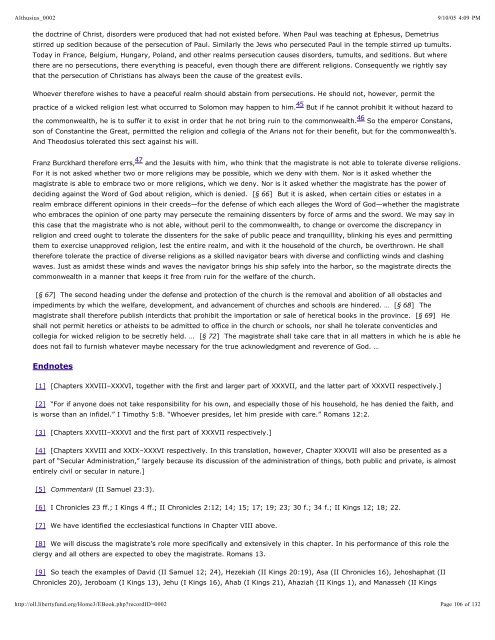Johannes Althusius: Politica - Hubertlerch.com - HubertLerch.com
Johannes Althusius: Politica - Hubertlerch.com - HubertLerch.com
Johannes Althusius: Politica - Hubertlerch.com - HubertLerch.com
Create successful ePaper yourself
Turn your PDF publications into a flip-book with our unique Google optimized e-Paper software.
<strong>Althusius</strong>_0002<br />
9/10/05 4:09 PM<br />
the doctrine of Christ, disorders were produced that had not existed before. When Paul was teaching at Ephesus, Demetrius<br />
stirred up sedition because of the persecution of Paul. Similarly the Jews who persecuted Paul in the temple stirred up tumults.<br />
Today in France, Belgium, Hungary, Poland, and other realms persecution causes disorders, tumults, and seditions. But where<br />
there are no persecutions, there everything is peaceful, even though there are different religions. Consequently we rightly say<br />
that the persecution of Christians has always been the cause of the greatest evils.<br />
Whoever therefore wishes to have a peaceful realm should abstain from persecutions. He should not, however, permit the<br />
practice of a wicked religion lest what occurred to Solomon may happen to him.<br />
45<br />
But if he cannot prohibit it without hazard to<br />
the <strong>com</strong>monwealth, he is to suffer it to exist in order that he not bring ruin to the <strong>com</strong>monwealth.<br />
46<br />
So the emperor Constans,<br />
son of Constantine the Great, permitted the religion and collegia of the Arians not for their benefit, but for the <strong>com</strong>monwealth’s.<br />
And Theodosius tolerated this sect against his will.<br />
Franz Burckhard therefore errs,<br />
47<br />
and the Jesuits with him, who think that the magistrate is not able to tolerate diverse religions.<br />
For it is not asked whether two or more religions may be possible, which we deny with them. Nor is it asked whether the<br />
magistrate is able to embrace two or more religions, which we deny. Nor is it asked whether the magistrate has the power of<br />
deciding against the Word of God about religion, which is denied. [§ 66] But it is asked, when certain cities or estates in a<br />
realm embrace different opinions in their creeds—for the defense of which each alleges the Word of God—whether the magistrate<br />
who embraces the opinion of one party may persecute the remaining dissenters by force of arms and the sword. We may say in<br />
this case that the magistrate who is not able, without peril to the <strong>com</strong>monwealth, to change or over<strong>com</strong>e the discrepancy in<br />
religion and creed ought to tolerate the dissenters for the sake of public peace and tranquillity, blinking his eyes and permitting<br />
them to exercise unapproved religion, lest the entire realm, and with it the household of the church, be overthrown. He shall<br />
therefore tolerate the practice of diverse religions as a skilled navigator bears with diverse and conflicting winds and clashing<br />
waves. Just as amidst these winds and waves the navigator brings his ship safely into the harbor, so the magistrate directs the<br />
<strong>com</strong>monwealth in a manner that keeps it free from ruin for the welfare of the church.<br />
[§ 67] The second heading under the defense and protection of the church is the removal and abolition of all obstacles and<br />
impediments by which the welfare, development, and advancement of churches and schools are hindered. … [§ 68] The<br />
magistrate shall therefore publish interdicts that prohibit the importation or sale of heretical books in the province. [§ 69] He<br />
shall not permit heretics or atheists to be admitted to office in the church or schools, nor shall he tolerate conventicles and<br />
collegia for wicked religion to be secretly held. … [§ 72] The magistrate shall take care that in all matters in which he is able he<br />
does not fail to furnish whatever maybe necessary for the true acknowledgment and reverence of God. …<br />
Endnotes<br />
[1]<br />
[Chapters XXVIII–XXXVI, together with the first and larger part of XXXVII, and the latter part of XXXVII respectively.]<br />
[2]<br />
“For if anyone does not take responsibility for his own, and especially those of his household, he has denied the faith, and<br />
is worse than an infidel.” I Timothy 5:8. “Whoever presides, let him preside with care.” Romans 12:2.<br />
[3]<br />
[Chapters XXVIII–XXXVI and the first part of XXXVII respectively.]<br />
[4] [Chapters XXVIII and XXIX–XXXVI respectively. In this translation, however, Chapter XXXVII will also be presented as a<br />
part of “Secular Administration,” largely because its discussion of the administration of things, both public and private, is almost<br />
entirely civil or secular in nature.]<br />
[5] Commentarii (II Samuel 23:3).<br />
[6]<br />
[7]<br />
I Chronicles 23 ff.; I Kings 4 ff.; II Chronicles 2:12; 14; 15; 17; 19; 23; 30 f.; 34 f.; II Kings 12; 18; 22.<br />
We have identified the ecclesiastical functions in Chapter VIII above.<br />
[8] We will discuss the magistrate’s role more specifically and extensively in this chapter. In his performance of this role the<br />
clergy and all others are expected to obey the magistrate. Romans 13.<br />
[9] So teach the examples of David (II Samuel 12; 24), Hezekiah (II Kings 20:19), Asa (II Chronicles 16), Jehoshaphat (II<br />
Chronicles 20), Jeroboam (I Kings 13), Jehu (I Kings 16), Ahab (I Kings 21), Ahaziah (II Kings 1), and Manasseh (II Kings<br />
http://oll.libertyfund.org/Home3/EBook.php?recordID=0002<br />
Page 106 of 132







